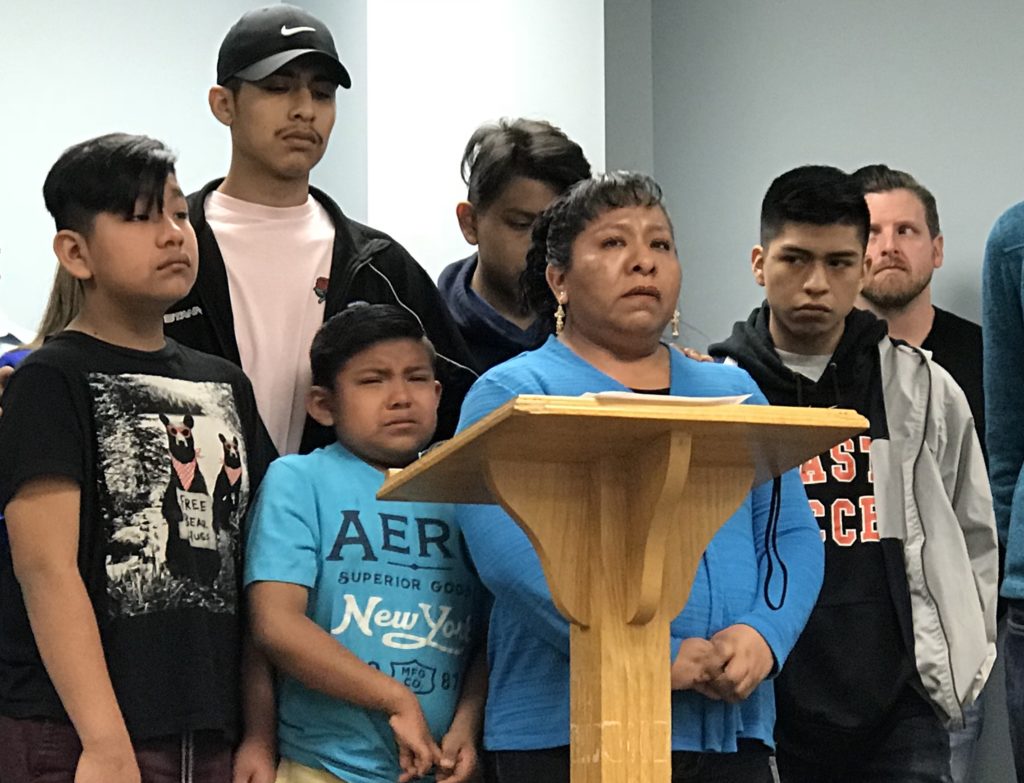
In April 2018, federal agents with the Department of Homeland Security and the IRS, along with officers from the Tennessee Highway Patrol and Morristown Police Department, conducted one of the largest raids at a slaughterhouse in Bean Station in recent Tennessee history.
More than 100 Latino employees at the Southeastern Provision slaughterhouse were rounded up, and several were deported after they were found to be living illegally in the United States.
More than four years after the raid, Southeastern Provision employees are suing federal agents. Reporting by Jamie Satterfield for the Tennessee Lookout revealed that the raid had nothing to do with the employees’ immigration status at all.
Satterfield joined This Is Nashville on Tuesday to explain the latest in the ongoing lawsuits.
This Is Nashville guest host Nina Cardona: The plaintiffs have been granted class action status in this case. Tell me about the lawsuit in question. What does it allege happened?
Jamie Satterfield: The basic allegations in this lawsuit are that federal agents from the Department of Homeland Security, the Internal Revenue Service, ICE, along with the Tennessee Highway Patrol, that they went to a federal judge and they said, “Hey, you know, we’re investigating this plant owner. He’s paying employees in cash, and we want to go in and search for records that might show us proof of tax evasion.” But instead, for months, they had been planning this as an immigration raid and specifically targeted anybody with brown skin. I mean, that was the goal. If you were white, you weren’t touched in this thing.
There are allegations of excessive force and really some some tacky behavior. An officer taking a selfie with a lot of these workers loaded on a bus for transport to an armory without any evidence of wrongdoing. One agent is accused of putting a gun to the head of a Latino worker who was using the bathroom. … And then there’s what we believe was captured on video, (which was) the same agent putting his boot on the neck of a worker. So essentially, this lawsuit alleges that there was a conspiracy to violate the civil rights of these workers and their guarantee of equal protection under the law.
NC: Who filed the lawsuit?
JS: It was actually filed by some nonprofit legal organizations, including the Southern Poverty Law Center. These groups are very adept at handling class action cases and, in this case, particularly involving migrant workers who believe that they have been mistreated.
NC: What is the significance of it being a class action suit? What difference does that make?
JS: It’s huge because you have some workers who … did not have a legal status in this country, and as a result of this raid, they were deported. So if each worker had to pursue a separate lawsuit — think about the worker who gets sent back, let’s say, to Mexico, that worker is going to have to knowingly return to the United States, a crime in order to pursue justice in this case.
So the judge, Travis McDonald, who’s a federal judge in the Eastern District, he found that that was unfair. … What’s going to happen now — thanks to class action certification — is there will be one trial based on one set of facts. And should the workers prevail and any damages be awarded, then all of these workers will be entitled to that.
NC: As more details about this case start to come out, what did you notice?
JS: When this raid went down, it was very clearly an immigration raid, and I think the public generally thought that was the purpose. … I think people saw this as a case about immigration. It’s not. It’s a case about policing. We have heard so much in this country about bad behavior by local police. Those allegations are far and few between when it comes to federal agencies. But in this case, there’s some serious misconduct alleged on the part of federal agents that then influenced the actions of the Tennessee Highway Patrol (and) the Morristown Police Department, who were looking to these federal agents for cues on how to behave.
So the case really is about allegations of abuse of power and abuse of police power, in particular brutality, misconduct and also targeting people because of their skin color.
NC: You made reference to a video earlier. The Tennessee Lookout is trying to get that unsealed. Is that correct?
JS: Yes. … This case was filed in 2019, and there have been over 700 documents with dozens of exhibits. It’s a lot of records. And I went through those and began to realize that there was some video of a specific instance of alleged misconduct. So the more I dug, the more I realized that the government was trying to keep this thing under wraps. I discovered, based on depositions, that it showed this agent with his boot on the neck of a man that’s face down with his hands behind his back. (There was) no reason at all for that officer to put his boot on this guy’s neck and keep it there, very much as happened in the George Floyd death. Once I discovered that, I went to the executive editor of the Tennessee Lookout, Holly McCall, and States Newsroom, and they very wisely chose to hire a lawyer and fight for release of this video.
The public needs to see what the agent did, good or bad.
NC: You’ve been covering courts for years. From that perspective, what stands out to you about this case?
JS: I think that it gives the public a really good opportunity provided that this video and other records are unsealed and made public. It provides us a really good window to judge whether or not policing in Tennessee is a problem. And I think it opens up a discussion on what we are willing as a society to tolerate from federal agents and local police and what we should not tolerate.
NC: This story got a lot of attention at the time. The New Yorker even sent a reporter to East Tennessee. Now, this class action lawsuit is moving forward. What do you think people still misunderstand about the case?
JS: I think … the knee jerk reaction to this case was, “You know what, if you’re here illegally, then you deserve what you get.” I don’t agree with that statement. But I also think that there’s a big difference between what these agents could have done, and that was to amass evidence that particular workers in that plant were undocumented. They could have gone to a magistrate judge and requested a proper search warrant. That’s not what they did. They deceived a federal judge. Another federal judge has already ruled that that there is evidence that they knowingly deceived a federal judge in the Eastern District. So I want people to pay attention, not so much to the issue of immigration but the issue of policing.
NC: What are you going to keep an eye on as this continues to develop?
JS: Just recently I’ve gotten — I call it a data dump — but essentially the judge has unsealed a lot of records and these are from inside. These are the agents’ own records. And so I’m already looking at, for instance, text messages between these agents that were the most charitable description would be tacky and and also showing the level of pre-planning on this thing.
Not all the agents that were involved in this thing were really on board. One of the things I’ve looked at as in deposition testimony that suggests there was at least one agent who said, “Hey, guys, we really need to go about this a different way.” And they just ignored him. I do have a story planned soon that will give people a real inside look from the agents’ perspective of the months leading up to this raid and then the day of this. We’ll also have some news this week that should publish tomorrow on the status of that video that we’ve gone to court to fight for the public’s right to see it.


